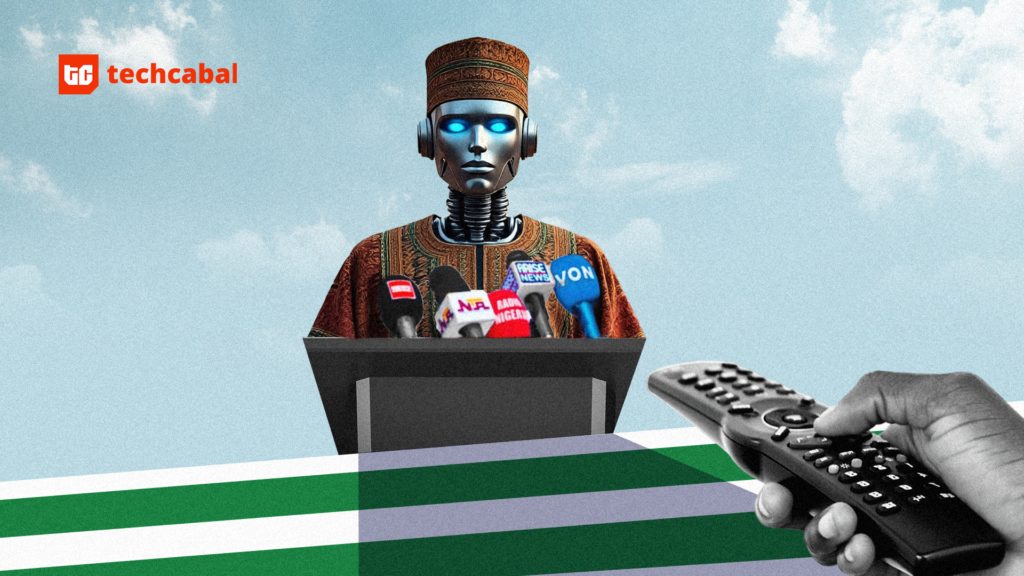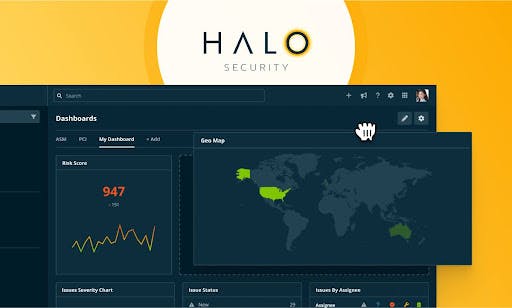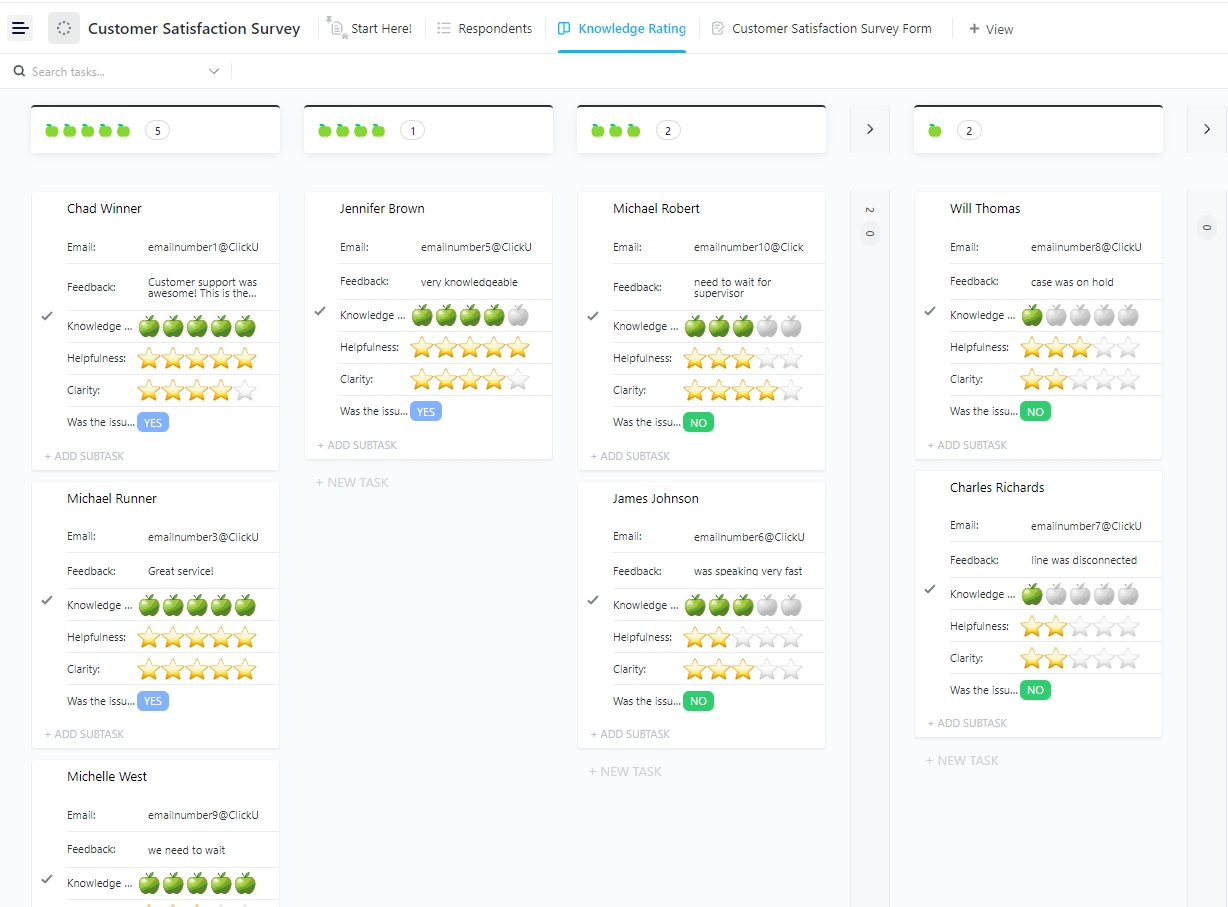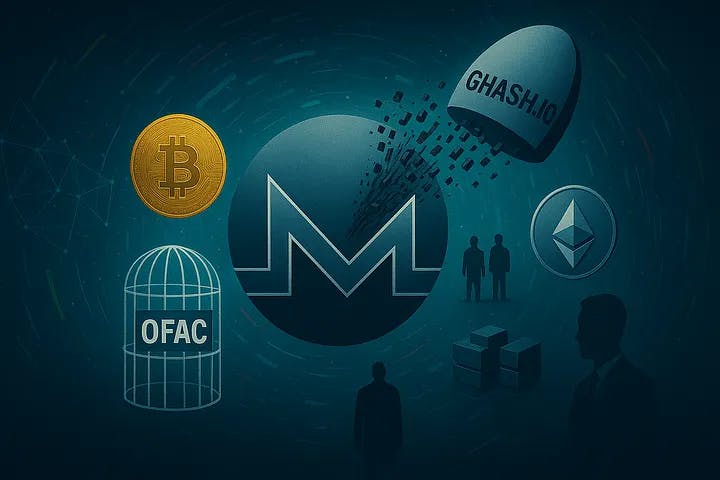Every Thursday, Delve Into AI will provide nuanced insights on how the continent’s AI trajectory is shaping up. In this column, we examine how AI influences culture, policy, businesses, and vice versa. Read to get smarter about the people, projects, and questions shaping Africa’s AI future. Let us know your thoughts on the column through this form.
In 2024, a video of President Bola Ahmed Tinubu made the rounds online. In the clip, Tinubu stands before a microphone, two men behind flanking him, addressing an unseen audience. “I am a fan of Chelsea, and I don’t like the way they are losing. Anytime they loss (sic), it gives me heart attack. So I’m planning to buy from their owner,” he says.
The problem is he never actually said it; the viral footage was AI-generated. And though the deepfake was not directly political, it revealed just how easily AI tools can fabricate a politician’s words, and how quickly such fabrications can spread, shaping public perception before the truth catches up.
As Nigeria looks toward the 2027 general elections, the dangers of AI-powered misinformation loom large. What happens when videos, voices, and images of political leaders can be convincingly faked? In a country where trust in visuals runs high and misinformation spreads at lightning speed, the risks are profound; as seen during the #EndSARS protests and the infodemic during COVID 19. Electoral bodies, political parties, fact-checkers, and AI researchers are already bracing for the challenge. From INEC’s new Artificial Intelligence Division to grassroots fact-checking networks and digital literacy drives, Nigeria is racing to build defences against a threat that could distort democracy itself.
In other climes
Nigeria is not the only country at risk of AI-powered misinformation. AI tools are being used in some parts of the world to generate voice-cloned robocalls impersonating politicians, create face-swapped campaign videos and fabricated screenshots, and amplify falsehoods through bot-driven social media networks.
In March 2024, the daughter of former South African President Jacob Zuma shared a deepfake video of Donald Trump, the current US President, endorsing the uMkhonto weSizwe (MK) political party, which gained significant online attention.
In Indonesia’s 2024 presidential race, deepfake videos falsely showed then presidential candidate, Prabowo Subianto, speaking Arabic to appeal to Muslim voters.
In Germany, a “Storm-1516” operation, set up numerous AI-powered websites to distribute deepfake content attacking politicians ahead of national elections.
The list goes on and on: in the US, France, Argentina, Bangladesh, Philippines, Canada and Spain to mention a few.
Similar tactics used with AI in these countries can be used to exploit Nigeria’s unique situation: high trust in visual and audio media, ethnic/religious sensitivities, and low digital literacy in many communities.
AI and elections: What’s at stake
For decades, elections in Nigeria have been mistrusted. Many citizens doubt the process not only because of allegations of ballot rigging or opaque collation procedures, but also because political parties themselves rarely stand on firm ideological ground. Politicians switch parties at will, alliances are built more on expediency than philosophy, and campaigns are often more about personalities than policies.
Elections are tense national events, shadowed by fears of manipulation, violence, or post-election unrest. Nigerians already brace themselves for outcomes they believe may be predetermined. This history has created a trust deficit now complicated further by technologies that influence the electoral process.
“In 2019 it was cheap fakes; in 2023 it was [false] edits and captions. Today, we face hyper-realistic voices and videos that ordinary citizens can hardly distinguish from reality,” says Dr. Chinonso E. Okoye, who serves as Senior Special Assistant to the Governor of Anambra State on Cyber & Infrastructure Security, and works at the nexus of technology, governance, and AI research under the Anambra State ICT Agency
Funso Doherty, a former Lagos gubernatorial candidate, says though misinformation has always existed in politics, “AI has the capacity to take this higher to another level.”
Fact-checkers and journalists on the frontline
As AI tools have become more adept at distorting reality, journalists and fact-checkers are creating and adapting tools to counter their influence.
“There are a wide range of tools,” says Fatimah Quadri of The FactCheckHub, “but the most common ones are Hive Moderation and Illuminarty AI. The challenge is speed: “Misinformation often travels faster than our corrections,” Quadri says.
“Now that we are dealing with AI misinformation, people need to be kinder to journalists working on misinformation,” says Nelly Kalu, Editorial Projects and Product Manager at the Center for Collaborative Investigative Journalism (CCIJ). AI tools can be “too fast, too quick, and too much for them to deal with.”
To address timeliness, fact-checkers are turning to prebunking: providing voters with verified facts before falsehoods spread. “Trust is built not just by debunking, but by being proactive, transparent, and consistent,” Quadri explains.
Yet, the awareness problem is real. “Many voters can identify simple photo manipulations,” she says, “but deepfakes, AI-generated audio, or hyper-realistic images are much harder to detect. In Nigeria, where trust in visuals and voice recordings is high, this makes voters particularly vulnerable.”
Regulators and preparedness
In May 2025, Nigeria’s electoral commission, INEC, set up an Artificial Intelligence Division mandating it to use AI to improve decision-making, voter engagement, and fight disinformation.
But Kingsley Owadara, AI ethicist and founder of the Pan-Africa Center for AI Ethics, says the electoral body must go beyond setting up new divisions. “There is a need to invest in training electoral officials, cybersecurity experts, and fact-checkers. Educating the electorate about AI disinformation is crucial. And platforms must be held accountable for removing manipulated content quickly.”
He outlines a three-layered response: restricting AI models from producing harmful propaganda, detecting synthetic content with forensic and provenance tools and removing harmful material with escalation protocols and evidence capture.
But he concedes that gaps exist in telling which content is AI generated, and which isn’t: “No detector is fully reliable as generators evolve. Detection must combine tech, human review, and clear ‘confidence labels’ on content.”
He recommends using auditing toolkits such as IBM’s AI Fairness 360 “to measure bias and apply mitigations”.
Victoria Oladipo, founder of Learn Politics, says the real risk is Nigeria’s weak policy framework. “Our cybercrime laws touch on internet fraud, but we lack a comprehensive AI policy. We need guidelines for usage, clear consequences for misuse, and investment in training. Otherwise, AI misinformation will outpace our institutions.”
Electoral bodies in other countries are already taking action. In the Philippines, the electoral body introduced guidelines mandating candidates to disclose their use of AI in campaign materials. The use of deepfakes was also considered an electoral offence in the May 2025 elections to curb the spread of misleading and malicious information.
Nigeria’s legal and policy systems address traditional forms of fake news and hate speech, but have not yet evolved to account for election-related AI misuse. Section 123 of the 2022 Electoral Act prohibits publishing statements about a candidate’s character that are false and misleading. This offence could result in a fine of 100,000 Naira ($65), six months’ imprisonment, or both.
The 2015 Cybercrimes Act is another applicable legislation for curbing the spread of malicious information. However, it is often criticised for its lack of clarity on scope and procedure, potentially leading to ambiguity and concerns about abuse. In the past, it has been used to silence critics of government officials and corporations.
“Regulation in this part of the world, sometimes, is not done honestly,” says Hamza Ibrahim, content moderation lead at the Centre for Information Technology and Development (CITAD).
He says that some of Nigeria’s laws are created without broad consultation with stakeholders, which can create some political bias. In the long run, these laws may not achieve the objective of addressing the growing spread of misinformation and disinformation narratives online.
What are tech startups and academia doing?
The fight cannot be left to INEC, regulators, and global platforms alone. Nigerian startups and universities have a role to play.
“Our edge is local innovation,” says Okoye. “Startups can build detectors tuned to Nigerian voices and imagery; academia can train AI models on our datasets; fact-checkers can deploy AI-assisted claim matching to cut response time in half.”
At Purplebee Technologies in Ekiti State, Operations Manager Omotayo Ibidunmoye sees the grassroots as key: “Trust is built through digital literacy training, transparent communication, and community-driven information hubs. We must train young Nigerians to recognise manipulated content and create local reporting channels to flag suspicious material.”
Civil society groups and newsrooms aren’t waiting on tech startups. Instead, they’re leading the charge by developing their own tools to tackle AI-driven misinformation.
“We can help to fight AI misinformation by making AI tools that are intelligent and fast enough to counter it,” says Kalu. “Think of Transformers [the movie], you know, the good machines fight the bad machines.”
The CCIJ is developing a data-driven tool called ElectionWatch which is being trained on Nigerian electoral data to analyse election misinformation and spot emerging patterns across platforms such as TikTok and Telegram. The project aims to strengthen fact-checking for Nigerian journalists and hopes to expand to other African regions in the coming years. “The tool is something we would have wanted when we did an investigation into Nigeria’s elections,” Kalu says. The CCIJ is currently developing ElectionWatch with support received from JournalismAI and the Google News Initiative.
FactCheckAfrica, a civil society group, has also built a news authenticator called MyAIFactChecker. The online AI-powered tool is designed for quick news verification. Users can submit a claim or headline, and the app provides a credibility assessment in seconds. It offers quick summaries of fact-check results alongside tone analysis of news content in languages like Hausa, Yoruba, and Swahili. The tool’s potential was also recognised by Google, which selected the fact-checking platform to join its 2024 Startup Accelerator Program.
“There’s a need for more homegrown tools made by Nigerians and Africans to combat misinformation,” Prudence Emudianughe, Chief Operating Officer of MyAIFactChecker, notes. “When a tool is made locally, it’s easier for people to relate to and use.”
But it has its limitations. The tool is still unable to verify deepfake audio, images, and videos, which are becoming increasingly prevalent in the election space.
“In the buildup to the [2023] general elections, we observed the release of phone calls with cloned voices exposing politicians planning to rig elections,” Samson Itodo, Executive Director of Yiaga Africa, a nonprofit focused on promoting democratic governance, says.
Ahead of the 2023 Nigerian presidential election, a voice clip featuring figures of an opposition party, the People’s Democratic Party (PDP), started gaining popularity on social media. It featured the presidential candidate, Atiku Abubakar, and his then-running mate, Ifeanyi Okowa, and former Sokoto State governor, Aminu Tambuwal, discussing how to rig the upcoming elections.
Further analysis by fact-checkers, including the Collaborative Media Project and the Center for Democracy and Development (CDD), analysed the audio and identified some unnatural characteristics that suggested the voices in the synthetic audio were AI-generated deepfakes.
Emudianughe says her organisation is currently upgrading MyAIFactChecker’s capabilities to better analyse AI-generated video, image, and audio content.
The road to 2027 Nigerian elections
There are already warning signs. Platforms like Google and TikTok have rolled out watermarking tools such as SynthID and auto-labels for synthetic content. The 2024 Tech Accord provides a global template for platform cooperation on election integrity.
As Okoye cautions, “detection alone is not enough. It must be paired with policy, rapid response, and human judgment.”
For Nigeria, the road to 2027 is clear but urgent: build digital literacy across rural and urban communities, hold platforms accountable, empower fact-checkers with real-time data, and establish national protocols for AI-driven political propaganda. Because in the age of AI, the question is no longer whether fake content will appear but whether democracy can survive the speed and scale at which it spreads.
We would love to know what you think about this column and any other topics related to AI in Africa that you want us to explore! Fill out the form here.
Mark your calendars! Moonshot by is back in Lagos on October 15–16! Join Africa’s top founders, creatives & tech leaders for 2 days of keynotes, mixers & future-forward ideas. Early bird tickets now 20% off—don’t snooze! moonshot..com









